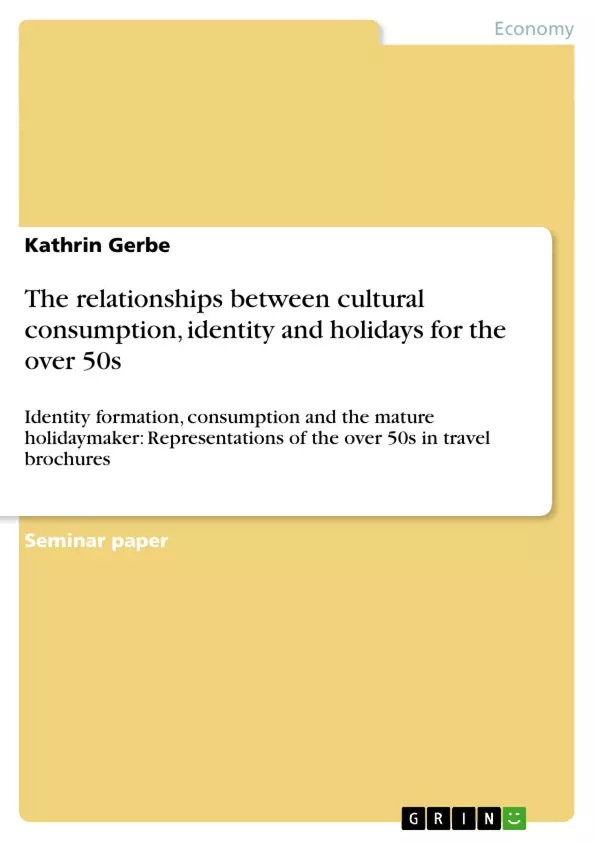For several decades now there has been a trend towards a declining birth rate and therefore rapid ageing of the British population. With good medical supplies, older people stay healthy and live longer: in the past twenty years life expectancy has risen from 70 years in 1981 to 75 years in 2001 for men, and from 76 to 80 years for women (Soule et al. 2005). When retiring in their 50 or 60s, people can expect to live twenty more years or longer. Soon people over 50, the post-war baby boomer generation born between 1946 and 1965, will constitute the majority of the population.
In contrast to people retiring in the 20th century, 21st century retirees are active and try to enjoy their leisure time. Although ‘consumer society creates negative […] images of later life, by implication, if not directly, by valuing and emphasizing youthful body image’ (Morris 1998 in Bradley & Longino 2001, p.18), ‘old’ people immerse themselves in sports and other social activities, living life to the full.
Holidays play an important part in this lifestyle as they are important for the ‘individual and social improvement and development, the resultant benefit of the self, including social self, being transportable back into the everyday environment as part of an ongoing life experience’ (McIntyre 2007, p.121).
In the past decades, several travel operators have tried to buy into the mature market. They established brands for the over 50s, featuring names like First Choice’s 'Leisurely Times', Thomson’s ‘Young at Heart’, Cosmos’ ‘Golden Times’ and Airtours’ 'Golden Years' (Ylänne-McEwen 2000), all off which basically offered beach holidays around Europe. Now their brochures have vanished from the market. They either have been replaced by updated concepts or been incorporated into the ‘mainstream’ summer and winter brochures.
In this essay, I would like to explore why these travel programmes have been rejected by the young at heart and what kind of holidays has replaced them. I will have a critical look at the representation of the over 50s in the new brochures. I will deconstruct the mature holidaymaker, considering what they want and need of their holiday and which identity they derive from their activities and destination choice.
Inhaltsverzeichnis (Table of Contents)
- Introduction
- Travel and Identity
- Brochure Themes
- Picturing practices – brochure vs ‘souvenir' photographs
- Conclusion
Zielsetzung und Themenschwerpunkte (Objectives and Key Themes)
This essay explores the changing landscape of holidays for the over 50s, analyzing the factors contributing to their rejection of traditional "Golden Years" travel packages and examining the new holiday preferences of this demographic. The focus is on how these preferences intersect with notions of identity formation and consumption in a society increasingly defined by youthfulness.
- The influence of the post-war baby boomer generation on travel trends
- The relationship between consumption, identity, and the aging process
- The impact of media representations and societal views on the self-perception of the over 50s
- The role of activity and adventure in shaping holiday identities
- The evolving concept of "subjective age" and its influence on travel choices
Zusammenfassung der Kapitel (Chapter Summaries)
- Introduction: This chapter sets the stage by discussing the aging population in Britain, highlighting the shift towards active retirement and the emergence of the over 50s as a desirable consumer group for travel operators. The chapter also introduces the essay's central focus on understanding the evolving holiday preferences of this demographic and their relationship to identity.
- Travel and Identity: This chapter delves into the concept of identity formation in the context of consumption, arguing that individuals in the fast-paced modern world have multiple and fluid identities shaped by their choices, including those related to travel. It highlights the importance of subjective age in understanding the holiday preferences of the "new-age elderly," who often feel younger than their chronological age and seek experiences that reflect this self-perception.
Schlüsselwörter (Keywords)
The essay explores the relationship between cultural consumption, identity, and holidays for the over 50s. Key themes include identity formation, subjective age, consumption, and travel motivations, drawing on sociological perspectives and consumer typologies to analyze the changing preferences of this demographic.
Frequently Asked Questions
What is the "mature market" in the travel industry?
The mature market refers to consumers over 50, particularly the post-war baby boomer generation, who are active and have significant leisure time for travel.
Why did traditional "Golden Years" holiday packages fail?
Many over 50s rejected these packages because they felt "subjectively younger" than the labels suggested and preferred mainstream or more active holidays over age-segregated beach trips.
What is the concept of "subjective age"?
Subjective age is how old an individual feels internally, which for the "new-age elderly" is often much younger than their actual chronological age, influencing their travel choices.
How are the over 50s represented in modern travel brochures?
Modern brochures often move away from stereotypical "elderly" images, instead focusing on activity, social improvement, and youthful lifestyles to appeal to the baby boomer generation.
What role do holidays play in the identity of the over 50s?
Holidays are seen as a tool for personal development and identity formation, allowing individuals to experience a "social self" that they carry back into their everyday lives.
- Citation du texte
- BA, MA Kathrin Gerbe (Auteur), 2007, The relationships between cultural consumption, identity and holidays for the over 50s, Munich, GRIN Verlag, https://www.grin.com/document/80561



